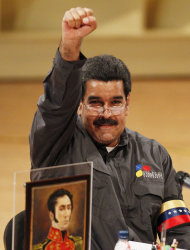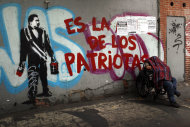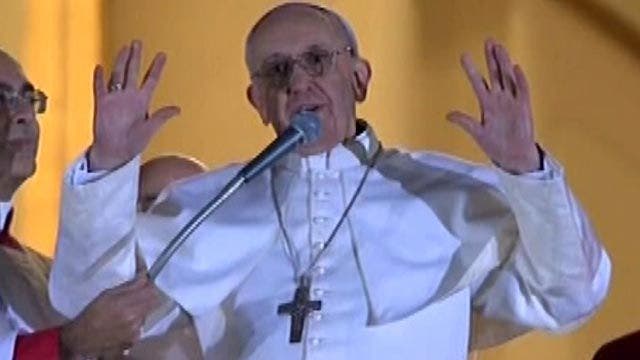Argentine Cardinal Jorge Mario Bergoglio named new pope
Published March 14, 2013
FoxNews.com
Read more: http://www.foxnews.com/world/2013/03/14/world-watches-as-cardinals-convene-for-2nd-day-papal-conclave/#ixzz2NUAi7oan
Argentine Cardinal Jorge Mario Bergoglio was elected by his peers Wednesday as the new pope, becoming the first pontiff from the Americas.
He chose the name Francis, drawing connections to the humble 13th-century saint who saw his calling as trying to rebuild the church in a time of turmoil.
As the long-time archbishop of Buenos Aires, Francis has spent nearly his entire career at home in Argentina, overseeing churches and shoe-leather priests. In choosing a 76-year-old pope, the cardinals clearly decided that they didn’t need a vigorous, young pope who would reign for decades but rather a seasoned, popular and humble pastor who would draw followers to the faith and help rebuild a church stained by scandal.
Groups of supporters waved Argentine flags in St. Peter’s Square as Francis, wearing simple white robes, made his first public appearance as pope.
Chants of “Long live the pope!” arose from the throngs of faithful, many with tears in their eyes. Crowds went wild as the Vatican and Italian military bands marched through the square and up the steps of the basilica, followed by Swiss Guards in silver helmets and full regalia.
Francis appeared on the balcony of St. Peter’s Basilica just after a church official announced “Habemus Papum” — “We have a pope” — and gave Bergoglio’s name in Latin.
“Ladies and Gentlemen, good evening,” he said to wild cheers before making a reference to his roots in Latin America, which accounts for about 40 percent of the world’s Roman Catholics.
Francis asked for prayers for himself, and for retired Pope Emeritus Benedict XVI, whose surprising resignation paved the way for the conclave that brought the first Jesuit to the papacy.
“You know that the work of the conclave is to give a bishop to Rome,” Francis said. “It seems as if my brother cardinals went to find him from the end of the earth. Thank you for the welcome.”
In one of his first acts as pope, Francis on Thursday morning planned to visit Benedict at the papal retreat in Castel Gandolfo south of Rome.
American Cardinal Timothy Dolan said Wednesday night at the North American College, the U.S. seminary in Rome, that Francis told fellow cardinals following the conclave that made him pope: “Tomorrow morning, I’m going to visit Benedict.”
The visit is significant because Benedict’s resignation has raised concerns about potential power conflicts emerging from the peculiar situation of having a reigning pope and a retired one.
Bergoglio has shown a keen political sensibility as well as the kind of self-effacing humility that fellow cardinals value highly, according to his official biographer, Sergio Rubin. He showed that humility on Wednesday, saying that before he blessed the crowd he wanted their prayers for him and bowed his head.
“Good night, and have a good rest,” he said before going back into the palace.
In a lifetime of teaching and leading priests in Latin America, which has the largest share of the world’s Catholics, Francis has been known for modernizing an Argentine church that had been among the most conservative in Latin America.
Like other Jesuit intellectuals, Bergoglio has focused on social outreach. Catholics are still buzzing over his speech last year accusing fellow church officials of hypocrisy for forgetting that Jesus Christ bathed lepers and ate with prostitutes.
Francis, the son of middle-class Italian immigrants, is known as a humble man who denied himself the luxuries that previous Buenos Aires cardinals enjoyed. Bergoglio often rode the bus to work, cooked his own meals and regularly visited the slums that ring Argentina’s capital.
He came close to becoming pope in 2005, reportedly gaining the second-highest vote total in several rounds of voting before he bowed out of the running in the conclave that elected Pope Benedict XVI.
Cardinal Dolan gave an inside glimpse into the drama of the conclave in his talk at the American seminary.
When the tally reached the necessary 77 votes to make Bergoglio pope, Dolan said, the cardinals erupted in applause. And when he accepted the momentous responsibility thrust upon him — ”there wasn’t a dry eye in the place,” the American cardinal recounted.
After the princes of the church had congratulated the new pope one by one, other Vatican officials wanted to do the same, but Francis preferred to go outside and greet the throngs of faithful. ”Maybe we should go to the balcony first,” Dolan recalled the pope as saying.
In choosing to call himself Francis, the new pope was linking himself with the much-loved Italian saint from Assisi associated with peace, poverty and simplicity. St. Francis was born to a wealthy family but later renounced his wealth and founded the Franciscan order of friars; he wandered about the countryside preaching to the people in very simple language.
He was so famed for his sanctity that he was canonized just two years after his death in 1226.
St. Francis Xavier is another important namesake. One of the 16th century founders of the Jesuit order, Francis Xavier was a legendary missionary who spread the faith as far as India and Japan — giving the new pope’s name selection possibly further symbolic resonance in an age when the church is struggling to maintain its numbers.
Francis will celebrate his first Mass as pope in the Sistine Chapel on Thursday, and will be installed officially as pope on Tuesday, on the feast of St. Joseph, patron saint of the universal church, according to the Vatican spokesman the Rev. Federico Lombardi.
Lombardi, also a Jesuit, said he was particularly stunned by the election given that Jesuits typically shun positions of authority in the church, instead offering their work in service to those in power.
But Lombardi said that in accepting the election, Francis must have felt it “a strong call to service,” an antidote to all those who speculated that the papacy was about a search for power.
In an interesting twist the Jesuits were expelled from all of the Americas in the mid-18th century. Now, a Latin American Jesuit has been elected head of the 1.2-billion strong Catholic Church.
Tens of thousands of people who braved cold rain to watch the smokestack atop the Sistine Chapel jumped in joy when white smoke poured out a few minutes past 7 p.m., many shouting “Habemus Papam!” or “We have a pope!” — as the bells of St. Peter’s Basilica and churches across Rome pealed.
Elected on the fifth ballot, Francis was chosen in one of the fastest conclaves in years, remarkable given there was no clear front-runner going into the vote and that the church had been in turmoil following the upheaval unleashed by Benedict’s surprise resignation.
A winner must receive 77 votes, or two-thirds of the 115, to be named pope.
For comparison’s sake, Benedict was elected on the fourth ballot in 2005 — but he was the clear front-runner going into the vote. Pope John Paul II was elected on the eighth ballot in 1978 to become the first non-Italian pope in 455 years.
Bergoglio’s legacy as cardinal includes his efforts to repair the reputation of a church that lost many followers by failing to openly challenge Argentina’s murderous 1976-83 dictatorship. His own record as the head of the Jesuit order in Argentina at the time has been tarnished as well.
Many Argentines remain angry over the church’s acknowledged failure to openly confront a regime that was kidnapping and killing thousands of people as it sought to eliminate “subversive elements” in society. It’s one reason why more than two-thirds of Argentines describe themselves as Catholic, but fewer than 10 percent regularly attend mass.
Under Bergoglio’s leadership, Argentina’s bishops issued a collective apology in October 2012 for the church’s failures to protect its flock. But the statement blamed the era’s violence in roughly equal measure on both the junta and its enemies.
“Bergoglio has been very critical of human rights violations during the dictatorship, but he has always also criticized the leftist guerrillas; he doesn’t forget that side,” Rubin said.
Bergoglio’s own role in the so-called Dirty War has been the subject of controversy.
At least two court cases directly involved Bergoglio. One examined the torture of two of his Jesuit priests who were kidnapped in 1976 from the slums where they advocated liberation theology. One accused Bergoglio of effectively handing him over to the junta.
Both men were freed after Bergoglio took extraordinary, behind-the-scenes action to save them — including persuading dictator Jorge Videla’s family priest to call in sick so that Bergoglio himself could say Mass in the junta leader’s home, where he privately appealed for mercy. His intervention likely saved their lives, but Bergoglio never shared the details until Rubin interviewed him for a 2010 biography.
Rubin said failing to challenge the dictators was simply pragmatic at a time when so many people were getting killed, and attributed Bergoglio’s later reluctance to share his side of the story as a reflection of his humility.
Bergoglio also was accused of turning his back on a family that lost five relatives to state terror, including a young woman who was 5-months’ pregnant before she was kidnapped and eventually killed in 1977. The woman’s child, who survived, was given to an “important” family.
Despite written evidence indicating he knew the child had been given away, Bergoglio testified in 2010 that he didn’t know about any stolen babies until well after the dictatorship was over.
Unlike the confusion that reigned during the 2005 conclave, the smoke this time around has been clear: black during the first two rounds of burned ballots, and then a clear white on Wednesday night — thanks to special smoke flares akin to those used in soccer matches or protests that were lit in the chapel ovens.
The Vatican on Wednesday divulged the secret recipe used: potassium perchlorate, anthracene, which is a derivative of coal tar, and sulfur for the black smoke; potassium chlorate, lactose and a pine resin for the white smoke.
The chemicals are contained in five units of a cartridge that is placed inside the stove of the Sistine Chapel. When activated, the five blocks ignite one after another for about a minute apiece, creating the steady stream of smoke that accompanies the natural smoke from the burned ballot papers.
Despite the great plumes of smoke that poured out of the chimney, Lombardi said, neither the Sistine frescoes nor the cardinals inside the chapel suffered any smoke damage.
The Associated Press contributed to this report.
 of U.S. physicians found 57% doctors view changes in the industry under the Affordable Care Act as a threat, and six in 10 physicians report it’s likely that many will retire earlier than planned in the next two to three years. This trend could cause more widespread issues in the health-care system that is already coping with doctor and nurse shortages in some areas of the country.
of U.S. physicians found 57% doctors view changes in the industry under the Affordable Care Act as a threat, and six in 10 physicians report it’s likely that many will retire earlier than planned in the next two to three years. This trend could cause more widespread issues in the health-care system that is already coping with doctor and nurse shortages in some areas of the country.

 View Photo
View Photo


